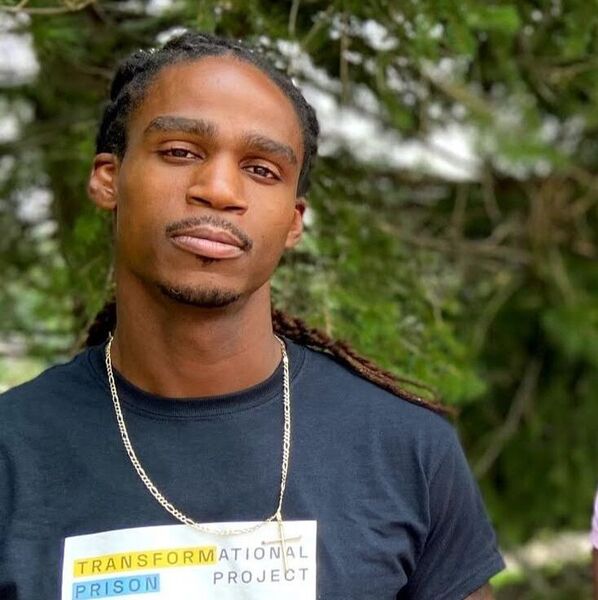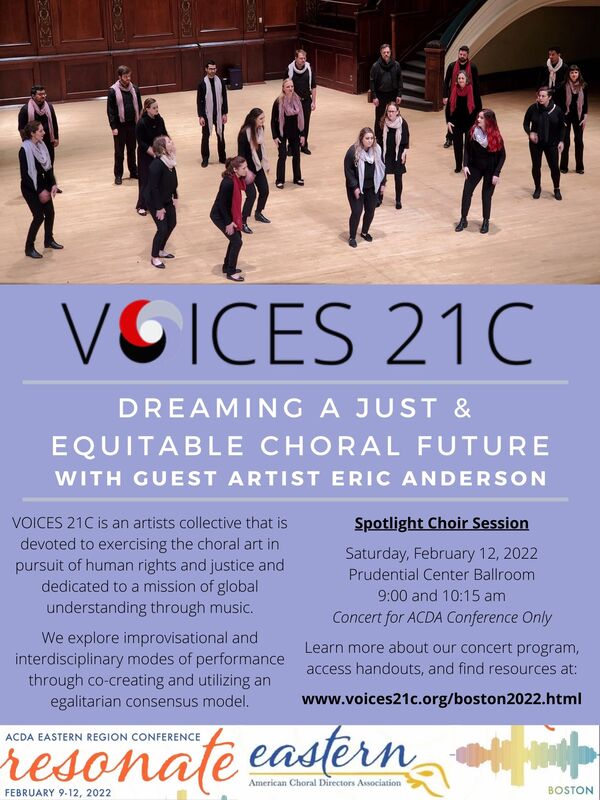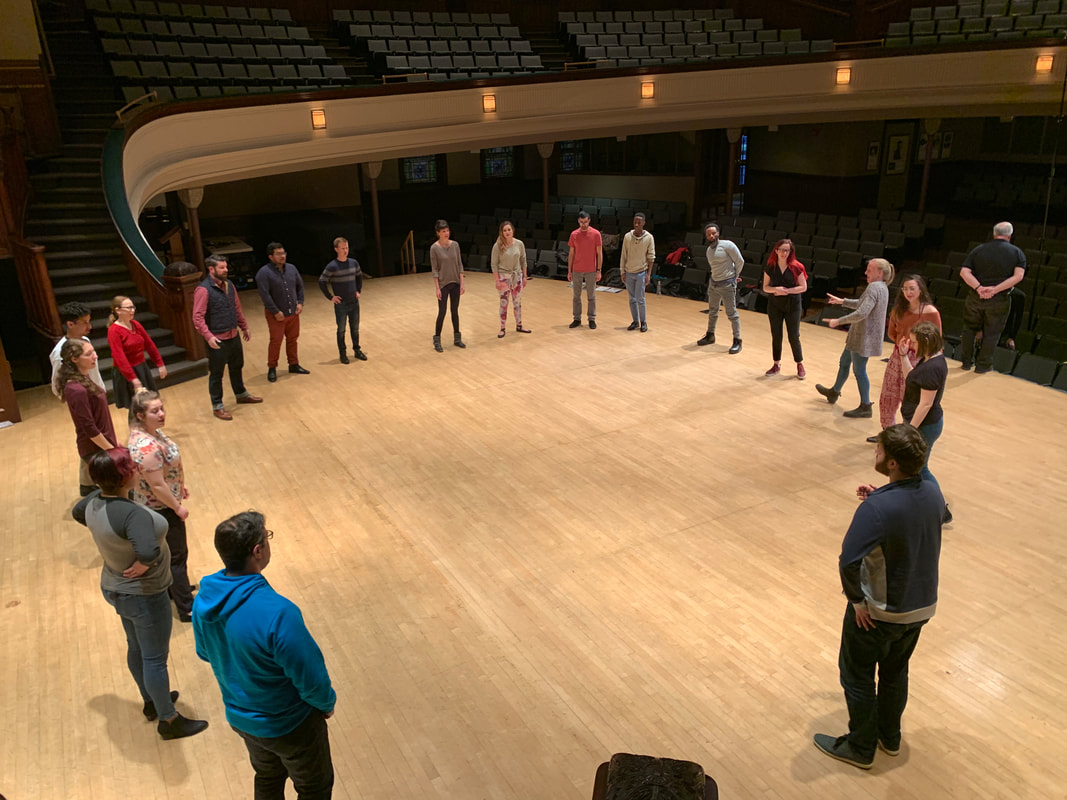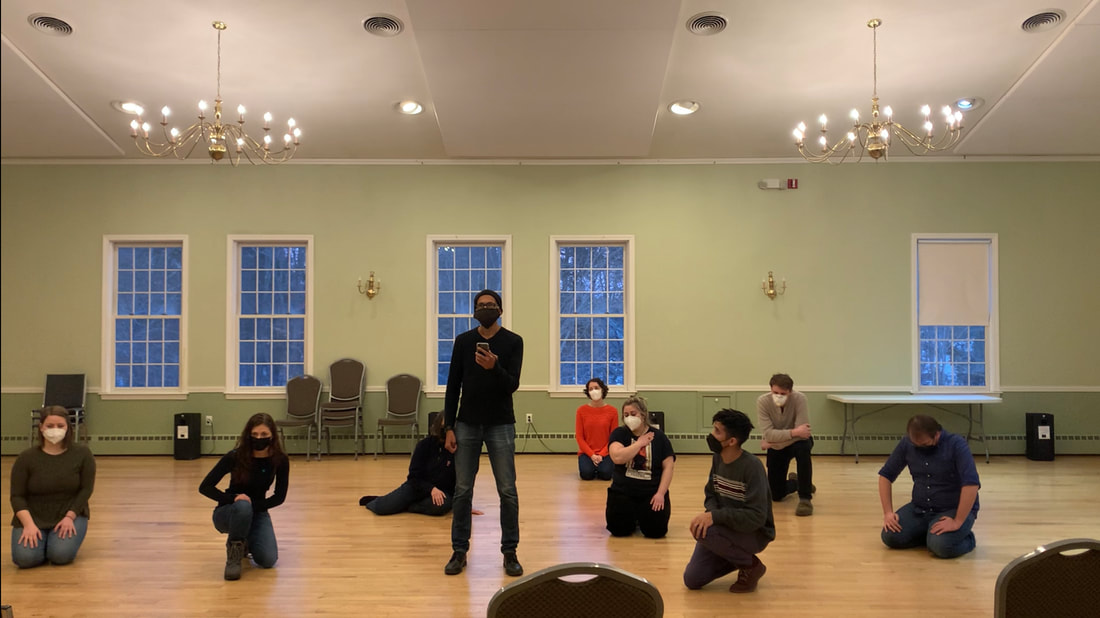Concert ProgramIntroduction & Land Acknowledgement
Improvisation on Ella's Song Circle of Life Eric Anderson, poet/activist; founder of Transformational Prison Project Say Her Name Alysia Lee Would You Harbor Me? Ysaye M. Barnwell Dos Cuerpos Julio Morales Ella's Song Bernice Johnson Reagon Interest Session Presentation Meditation on Breathing Sarah Dan Jones |
Presentation NotesOur Values
Being Good Over Sounding Good → We prioritize being in right relationship with one another and process over product Every Member Has Creative and Artistic Freedom → We empower the creative and artistic imagination of each member and collaborator through involvement in shaping artistic product Power With Instead of Power Over → Decision making is by consensus, administration is non-hierarchical We have a responsibility to use our voice and leverage our privilege to speak out on issues of peace and justice. → programming speaks directly to issues of human rights and justice in the U.S. and abroad and centers marginalized voices |
|
During Say Her Name we 'put these names in the air' to honor and remember them, their lives, and their stories:
Ahmaud Arbery Remy Fennell George Floyd Rita Hester Atatiana Jefferson Amir Locke Duvall Princess Trayvon Martin Breonna Taylor We invite you to add the names of others who have been killed by gun violence, specifically those black bodies killed by police actions. Through this link you can learn about each of these individuals and many others. For a more complete list of names and the stories of their lives, visit this online space developed by Stanford University. |
Dos Cuerpos
Dos cuerpos frente a frente son a veces dos olas y la noche es océano. Dos cuerpos frente a frente son a veces dos piedras y la noche es desierto. Dos cuerpos frente a frente son a veces raíces en la noche enlazadas. Dos cuerpos frente a frente son a veces navajas y la noche relámpago. Dos cuerpos frente a frente son dos astros que caen en un cielo vacío. |
Two Bodies
Two bodies face to face Are at times two waves And the night is an ocean. Two bodies face to face Are sometimes two stones And the night a desert. Two bodies face to face Are at times two roots laced into the night. Two bodies face to face Are sometimes two knives And night strikes sparks. Two bodies face to face Are two stars falling In an empty sky. |
During Ella's Song we add the following verse contributed by an artist, Truth, who was incarcerated in MCI-Norfolk at the time of performance. It is:
Forgiveness is often used
as a cheap substitute for the cure;
Nibbling on the crumbs of justice,
they call us greedy when we want more.
Forgiveness is often used
as a cheap substitute for the cure;
Nibbling on the crumbs of justice,
they call us greedy when we want more.
|
Eric Anderson, Guest Artist
Poet, Activist, Restorative Justice Leader Eric M. Anderson oversees Transformational Prison Project’s daily operations, communications and website, social media sites, office management, business pipeline, and co-develops programming. Eric is also a lead facilitator and circle keeper for TPP with over seven years of leadership experience with restorative justice. After 10 years in prison, Eric began to follow his passion for cooking, becoming the culinary supervisor for the Boston Convention Center, where he led a 10-person team. He volunteers with Community Servings at a facility that supports people living with HIV/AIDS and people living with difficult illnesses and diets. He volunteers and mentors young men through Roxbury District Court’s CHOICE Program, Everyday Boston and Communities for Restorative Justice where he is a fellow improving his professional and organizational skills while managing their events and training and offering his own skills and experience with restorative justice through public sharing and leading Restorative Justice Circles. He also partnered and gave presentations at Suffolk University, Boston University, Vermont school of Law, Boston College Law, Harvard T.H. Chan School of Public Health, Harvard Law, Northeastern Law, Tufts University, and Utec. |
Resources and Inspirations for this Program
Transformation Prison Project - This organization was founded in 2013 from inside the Norfolk State Men's Prison, MA to explore the meaning of restorative justice. Eric Anderson, today's collaborator, was one of those founders.
Say Her Name - Read more about the powerful work of artist Alysia Lee and the responses to this original song.
BU Race, Prison, Justice Gallery - Explore this collection of newly created art developed with current and formerly incarcerated artists and members of the Boston University Community.
Common Ground Voices / La Frontera - This organization, co-led by Emilie Amrein and André de Quadros, served as the inspiration for the original motivation and staging for Dos Cuerpos. You can learn more about their work at the U.S. - Mexico Border Wall through the link.
This program was based on the work of the race and incarceration portion of our full concert at ACDA Rochester in 2020. Complete resources on that program are available here.
Say Her Name - Read more about the powerful work of artist Alysia Lee and the responses to this original song.
BU Race, Prison, Justice Gallery - Explore this collection of newly created art developed with current and formerly incarcerated artists and members of the Boston University Community.
Common Ground Voices / La Frontera - This organization, co-led by Emilie Amrein and André de Quadros, served as the inspiration for the original motivation and staging for Dos Cuerpos. You can learn more about their work at the U.S. - Mexico Border Wall through the link.
This program was based on the work of the race and incarceration portion of our full concert at ACDA Rochester in 2020. Complete resources on that program are available here.
Other Resources and Inspirations
Equal Justice Initiative - https://eji.org/
The Marshall Project - https://www.themarshallproject.org/
Prison Policy Initiative - https://www.prisonpolicy.org/reports/pie2020.html
Poor Peoples Campaign - https://www.poorpeoplescampaign.org/
Common Ground Voices - https://www.commongroundvoices.com/
Common Ground Voices La Frontera - https://www.cgvlafrontera.org/english
ACLU - HRCA - https://www.aclu.org/other/human-rights-council-resolution-ahrc30l16-human-rights-administration-justice-including
Equal Justice Initiative - https://eji.org/
The Marshall Project - https://www.themarshallproject.org/
Prison Policy Initiative - https://www.prisonpolicy.org/reports/pie2020.html
Poor Peoples Campaign - https://www.poorpeoplescampaign.org/
Common Ground Voices - https://www.commongroundvoices.com/
Common Ground Voices La Frontera - https://www.cgvlafrontera.org/english
ACLU - HRCA - https://www.aclu.org/other/human-rights-council-resolution-ahrc30l16-human-rights-administration-justice-including
|
About Our Process...
Our process typically starts with our intended audience. Who will be the recipient of our stories and what do we want them to walk away with? We have not yet presented a concert without seriously considering these questions as a central part of our programming. Once we have identified our audiences and our focus, we begin. A small team takes on identifying a larger vision for the program and begins to build out repertoire ideas. This small team (including André) has a series of conversations in regard to each piece and its specific focus. What intent does each piece have and what story does it want to tell? How can it respond to the pieces around it? What does it offer our singers? At each of these stages, we present our progress to the ensemble for their feedback. Once we are able to answer these questions, we start forming a tentative order for the full program. We then interrogate our programming as a full ensemble. We ask each singer to consider each piece as an individual work and its artistic integrity, what narratives we are discussing, we ask if any voices are missing that should be represented, how the transitions flow from work to work, and if they feel that we achieved a certain message. The answers to these questions are varied and complex and these questions take a lot of time to discuss and process. As a result, we play around with the order and have a lot of conversations in rehearsal. It is in these rehearsals where we prioritize time for discussion and allow flexibility in our planning that we often develop a deeper, more cohesive, and meaningful performance. Our staging ideas are also developed from this time spent in conversation and interrogation of the works. An important note about this process relates to our ensemble culture. There is a dynamic that has been cultivated within the ensemble of acceptance to questioning. We firmly believe that if we are going to create the strongest possible program, that we need to be highly critical of it and that going through this process all together, will make the program and our understanding of how to deliver it, much stronger. At the end, through all of our self-criticism and interrogation, we make sure that our final product leads us to one of our principles, “there is no wrong answer.” Within our context of intense reflection and planning, when we get to the stage after having developed and built our program, the goal is to communicate the best version of our story, which includes following our impulses in the moment. As we walk on stage, we remind ourselves at the end to be human, be proximate, and engage. We firmly believe that the power of our voice(s) lies in the stories that we tell. We would love to share more of our experience, process, and work with you or your ensemble. If you want to know more about VOICES 21C - reach out, follow us anywhere, join our Patreon, or talk to a singer. We are always more than happy to engage with you. |





